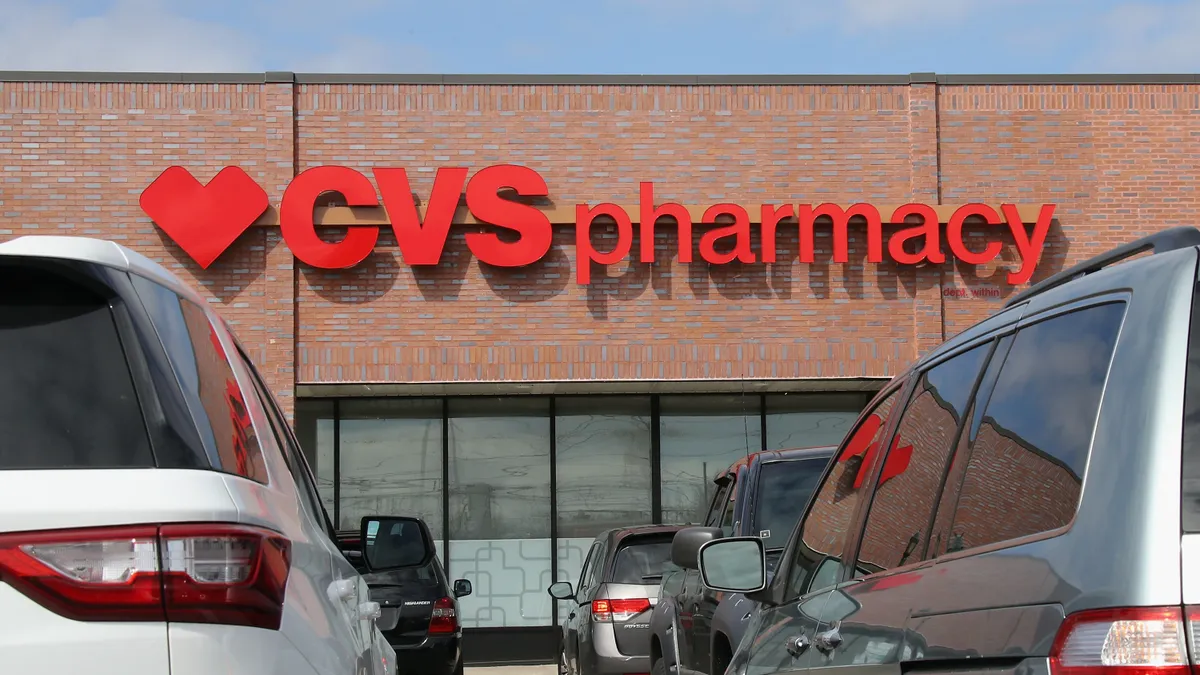Dive Brief:
-
CVS on Wednesday said it will shutter 75 retail stores in 2020, mostly through natural lease expirations, with 22 closures in the first quarter of the fiscal year, CFO Eva Boratto told analysts Wednesday morning. That will be in addition to the 46 "underperforming stores" closed during the second quarter of fiscal 2019, according to a Wednesday filing with the Securities and Exchange Commission.
-
The report included results from its third quarter, when total company revenue rose 36.5% to $64.8 billion. Retail revenue, which includes front-of-store sales, rose 2.9% to $21.5 billion, according to a company press release. Front-store revenues, which benefited from increases in health and beauty sales, were about 21.5% of that total, the company said.
-
Net income in the quarter rose 10% to $1.5 billion, according to the filing. Retail operating income fell 26.6% and adjusted operating income fell 6.5% — both hurt by continued medical reimbursement pressure, partially offset by higher prescription volume and improved front-store margin.
Dive Insight:
CVS — which years ago decided on a medical care focus that has entailed dropping lucrative tobacco sales, acquiring health insurer Aetna and developing a new clinic-based store concept — appears to be shrugging off its competition.
Rival Walgreens is reportedly mulling a take-private effort as it struggles to develop a growth strategy not centered on acquisitions. The drugstore retailer failed in its attempt to take over Rite Aid, which itself is buckling under the fierce competition and volatile prescription reimbursements in the space.
In fact, CVS appears to be taking share from them, according to Moody's Investors Service Vice President Mickey Chadha, who noted the positive impact of the health concept stores. "[T]he company continues to execute well in a tough industry environment with better than expected earnings and continued debt reduction," he said in emailed comments. "Script volume growth remains healthy and indicates that the company is gaining market share, and the Health Hubs, although still in the nascent stage, seem to be gaining traction, which is positive for the future operating performance of the company."
The retailer characterized the trimming of its footprint as a planned rationalization of underperforming locations. In fact, those Health Hubs have likely helped improve traffic trends, according to foot traffic analytics platform Placer.ai. The company had "a strong summer," with July visits up 8.3% and August visits up 7.8% over last year, according to a report emailed to Retail Dive.
The company is doubling down on the concept in light of the strong results from pilot stores, which include "share gains at retail" that has meant higher front-store sales, traffic and margins, CEO Larry Merlo told analysts Wednesday morning. The company plans to add three more metro areas to that effort, with 50 in operation by year end and 1,500 by the end of 2021, he said.
The company is also benefiting from its Aetna deal, according to Moody's. "The company’s 2020 [pharmacy benefit management] selling season revenue improved by about $1 billion since Q2 and synergies associated with the Aetna transaction continue to be on track," Chadha said. "The company has reduced net debt by about $8 billion since the closing of the transaction, and although reimbursement pressure remains a major headwind, we continue to expect the company to continue to improve credit metrics in the next 12 to 24 months."
















